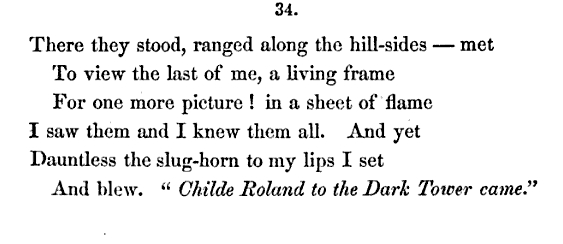"Childe Roland to the dark tower came"comes from Edgar's song in Lear, and then is to be found again in Browning's poem titled " 'Childe Roland to the Dark Tower Came.' " Note that the quotation marks and the sentence-ending period are part of the title --

-- and that this is confirmed by the running heads in the original:

Browning's title is a quotation of Shakespeare's line, and the fact that it's a quotation matters. In Shakespeare the line doesn't rhyme; and yet it feels like a line that must rhyme in the song of which it's a fragment. At least it feels that way to Browning, whose attributional parenthesis under the title is: "(See Edgar's song in Lear.)", also with a period at the end (I could be convinced that case matters to, but I don't think that here there's any harm in the mild difference between our titling conventions and Browning's):

Then, at the end of Browning's poem - it's not the song Edgar is singing; rather Edgar must be singing a song based on Roland's adventure, which, Bloomianly, transumes the song - at the end of Browning's poem, we get the line in both quotation marks and italics --

-- as Roland achieves the italicized otherness, timelessness, of the original. Italics were invented by Aldus in the fifteenth century (and supposed to imitate Petrarch's handwriting, so a great authority's annotation or addition to a printed text. They stand, originally, for something that comes from elsewhere, something that doesn't belong to the original, to the utterer of the text we are reading, but to which that text is sufficiently relevant that it is entitled to demand or to entreat the italicized words. They are words granted or permitted from elsewhere. The italicized words in the King James Bible are the translators' clarifying additions, permitted, but only under that flag, by the sublime austerity of the original, its sublimity reflected in the italics that the supplementary words must display; the italicized words in quotations (italics were far older signs of quotation than are our inverted commas) were the words of another that for a moment the text wishes to display while not presuming to take possession of them. We put titles in italics to show that their title belongs to some other, that we are not the originators of the phrase. Italics and quotation marks have a similar genealogy and have leap-frogged each other in their somewhat out-of-synch history, but the point is whatever quotation marks have ever done, so have italics, and vice versa.
At the end of " ' Childe Roland to the Dark Tower Came. ' " the quotation marks are for Roland himself: here are the words I uttered. But he didn't quite utter them: he blew them (in proper Shelleyean manner) through the slug-horn, both horn and slogan (the origin of the word), so that what he blew became the self that was that quotation. And if the quotation marks are his, the sign of his breath through the horn, his utterance of words come from elsewhere, through the trumpeting of the prophecy that the words constitute, the italics denote Shakespeare, or Edgar, or Lear (the play), or the source that makes Edgar's song a quotation of a line from elsewhere. That last most of all: Shakespeare quotes them from elsewhere, and now Browing is quoting them from that same elsewhere.
What does this have to do with shortish accounts of the rhyme? Only this: that we feel the rhyme must rhyme (that's why it's from a "song"); and Browning makes it rhyme (with "flame" and "frame"), and yet the line still stands alone, rhyming with some word in a context orthogonal to the poem and to the song, a kind of signal from that other world of the rhyme we'll never know, but a rhyme that we know the line we do have nails, know it simply through the fact that Childe Roland to the Dark Tower came.
No comments:
Post a Comment